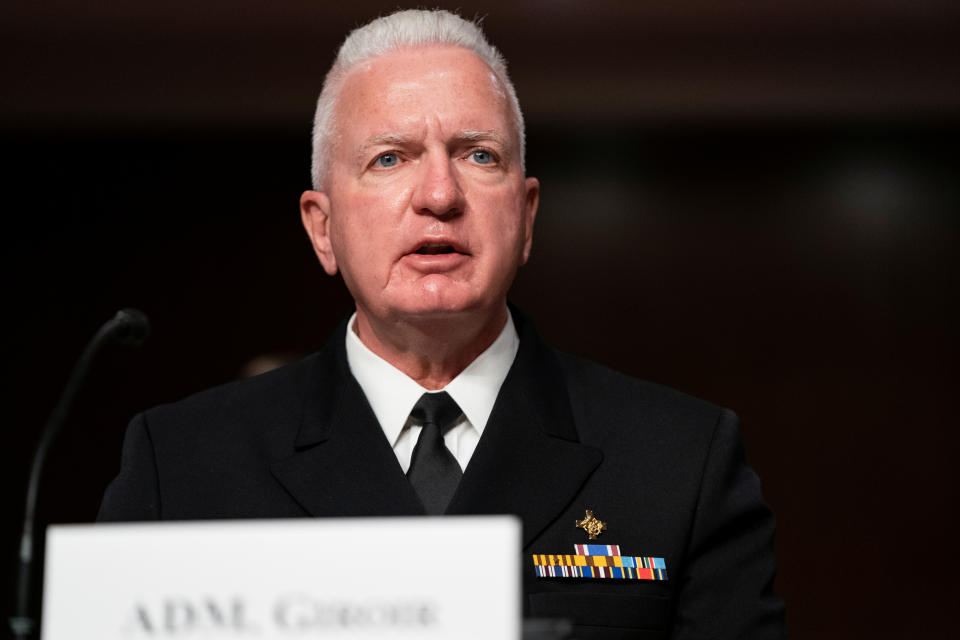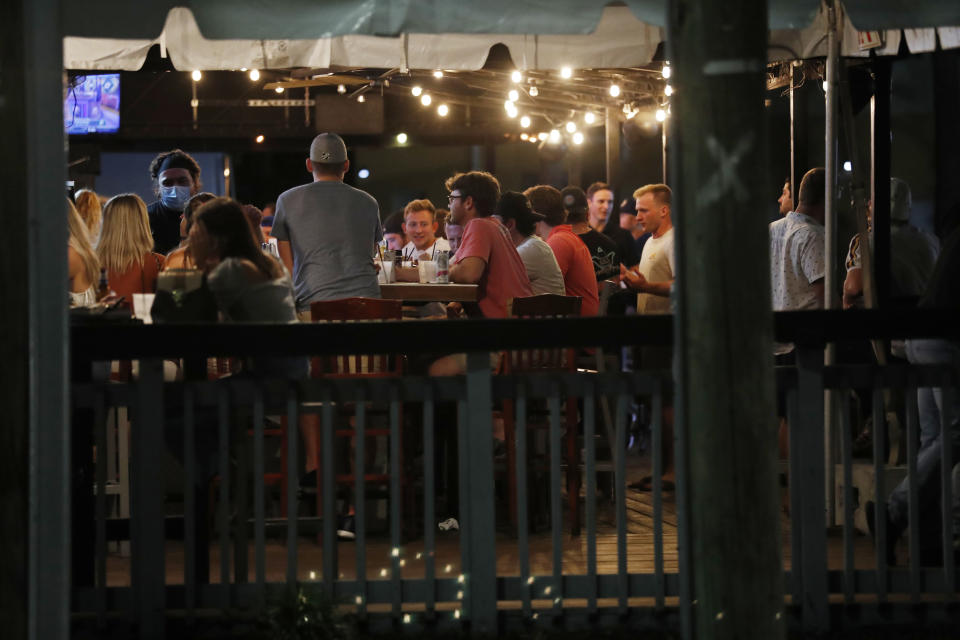CDC criticizes White House medical adviser's discredited mask claim
WASHINGTON — The Centers for Disease Control and Prevention is criticizing a top White House coronavirus adviser for spreading misinformation about facial coverings, in a potential escalation of the feud between the administration and public health officials within the federal government.
That adviser, Stanford neuroradiologist Dr. Scott Atlas, appears to have taken a statistic from a CDC study wildly out of context to pose an anti-mask argument that has been central to his and President Trump’s approach.
Atlas, a source of nearly endless controversy, sent a tweet on Saturday calling into question the efficacy of facial coverings in preventing the coronavirus. “Masks work? No,” said his tweet. In recent months, Atlas has become Trump’s pandemic point man, angering other members of the White House coronavirus task force, including Drs. Deborah Birx and Anthony Fauci.
One former staffer on the coronavirus task force called him a “disaster.”
The missive was widely condemned by public health officials and ultimately removed by Twitter. It has also earned disapproval from the CDC, whose director has complained about Atlas’s credibility.
In a statement emailed to Yahoo News, the CDC disputed Atlas’s conclusions without naming him directly. “CDC guidance on masks has clearly stated that wearing a mask is intended to protect other people in case the mask wearer is infected. At no time has CDC guidance suggested that masks were intended to protect the wearers.
“Growing evidence increasingly shows that wearing masks in community settings reduces transmission among individuals in that community,” the statement continued. “There are laboratory studies, animal studies, community and epidemiological studies, as well as policy studies that show masking reduces transmission in communities by blocking exhaled respiratory droplets.”

The CDC further speculated that while mask wearing has led to “sufficient protection” within subjects’ social networks, those subjects likely contracted the coronavirus in a bar or restaurant, where people take off masks to eat and drink.
Atlas’s Saturday tweet cited Los Angeles, Miami, Israel and Spain as places where, he said, masks did not work. He said there were “many harms” to wearing masks, though it is not clear what those were.
That conclusion appeared to be based on an errant reading of a CDC study published in the Sept. 11 issue of its Morbidity and Mortality Weekly Report, a compendium of the latest research. The study in question reviewed data from 154 people who had tested positive for the coronavirus and had been treated at 11 medical centers around the country.
Atlas’s tweet was subsequently removed for violating Twitter’s rules on spreading misinformation. The social media site has taken a more aggressive stance in regard to conspiracy theories and fake news, including when such items are disseminated by the president himself.
Uncowed, Atlas followed up on Saturday with another tweet, in which he attempted to explain his original message. “That means the right policy is @realDonaldTrump guideline: use masks for their intended purpose — when close to others, especially hi risk,” he wrote, in an apparent justification of the tweet that has been removed. “Otherwise, social distance. No widespread mandates.”
Among those rebuking Atlas was Dr. Brett Giroir, an assistant health secretary. “#Masks work? YES,” he wrote on Twitter, imitating the rhetorical style of Atlas’s message.
“And even though cases/hospitalizations are increasing,” Giroir added, “we can control #COVID19 by wearing masks when we can’t distance, avoiding crowds especially indoors, good hygiene, and smart testing of contacts and to identify/isolate those asymptomatic but infectious.”

While the vast majority of Americans support wearing masks, some backers of the president have steadfastly challenged their efficacy. Some of Trump’s advisers believe that the anti-mask message plays well with his base, which tends to be suspicious of government guidance and scientific expertise. Others, however, see little more than an ongoing distraction that damages Trump every time he is forced to explain his position on masks.
Atlas has been a primary enabler of the anti-mask message. He first gained the president’s attention for Fox News appearances in which he questioned public health measures and endorsed concepts like “herd immunity,” which leading scientists have repeatedly said won’t work for the coronavirus and has the potential to kill millions.
Ever since moving in August from Stanford to the White House, where he has served as Trump’s pandemic point man, he has engendered intense criticism.
The weekend controversy does not appear to have been especially helpful to the White House, or the Trump campaign, which has been attempting to project an air of competence regarding its handling of the pandemic. And it only deepened the rift between Trump and federal agencies that have found their efforts to contain the coronavirus frustrated by the White House itself.
The Department of Health and Human Services also distanced itself from Atlas’s tweets. A representative for the department who asked not to be named noted that HHS chief Alex Azar has “consistently encouraged” social distancing, handwashing and the use of a face covering “when you can’t watch your distance.”
At the same time, Azar recently met with three scientists who espouse the same “herd immunity” strategy of which Atlas is a vociferous proponent.
The latest Atlas-related controversy comes in the final weeks of a presidential election in which the coronavirus is a foremost concern. At a town hall last Thursday, Trump cited the same CDC study that appeared to animate Atlas.
“I’m good with masks. I’m OK with masks,” the president told moderator Savannah Guthrie of NBC. “I tell people, wear a mask. But just the other day, they came out with a statement that 85 percent of the people that wear masks catch it.”

Brian Morgenstern, a White House spokesman, disputed the notion that Trump and Atlas were discouraging mask use. “The position has not changed,” he told Yahoo News in a text message. “The recommendation remains to wear a mask when you cannot socially distance. The point they were making is that many people who have contracted Covid frequently wear masks and that masks are not perfect solutions.”
Experts criticized that assertion as yet another misunderstanding of how masks work.
Dr. Ashish Jha, the public health dean at the Brown University School of Health, took issue with the notion that a solution had to be “perfect” to be effective. “Nothing is perfect,” he said in response to Morgenstern. “But serious people don’t look for the perfect solution.”
Linsey Marr, a leading aerosol scientist at Virginia Tech who was not involved in the CDC study, came to the same conclusion. “It is true that masks are not a perfect solution, but they are effective at slowing transmission in the community,” she told Yahoo News.
“Anecdotally, it is possible that there are people who have contracted COVID-19 who ‘frequently’ wear masks,” Marr went on to say. “But do they wear masks when it matters most, like at family gatherings and in restaurants? Masks are needed at all times in public buildings when we are with others who are not in our own household.”
In other words, as pandemic fatigue sets in and people begin to congregate in bars, restaurants and other social settings, the benefits of masks could be undone. CDC Director Robert Redfield recently warned against small-scale family gatherings, which he said were contributing to the spread of the coronavirus.

Brown University’s Jha compared face masks to seat belts, which were also once challenged as an overreach of the regulatory state but have since become commonplace. “Some people who are injured in car accidents were wearing a seat belt,” Jha told Yahoo News. “But seat belts save lives — and masks save lives.” He added that “masks are very helpful in reducing the spread of the disease.”
Trying to pick out cases in which masks failed to prevent people from getting sick showed a “complete lack of understanding about epidemiology causality and risk factors,” said Eric Feigl-Ding, an epidemiologist. “It’s meaningless because you can also find smokers who live to 100 years old and vegans who run marathons but die at age 40.”
_____
Read more from Yahoo News:



